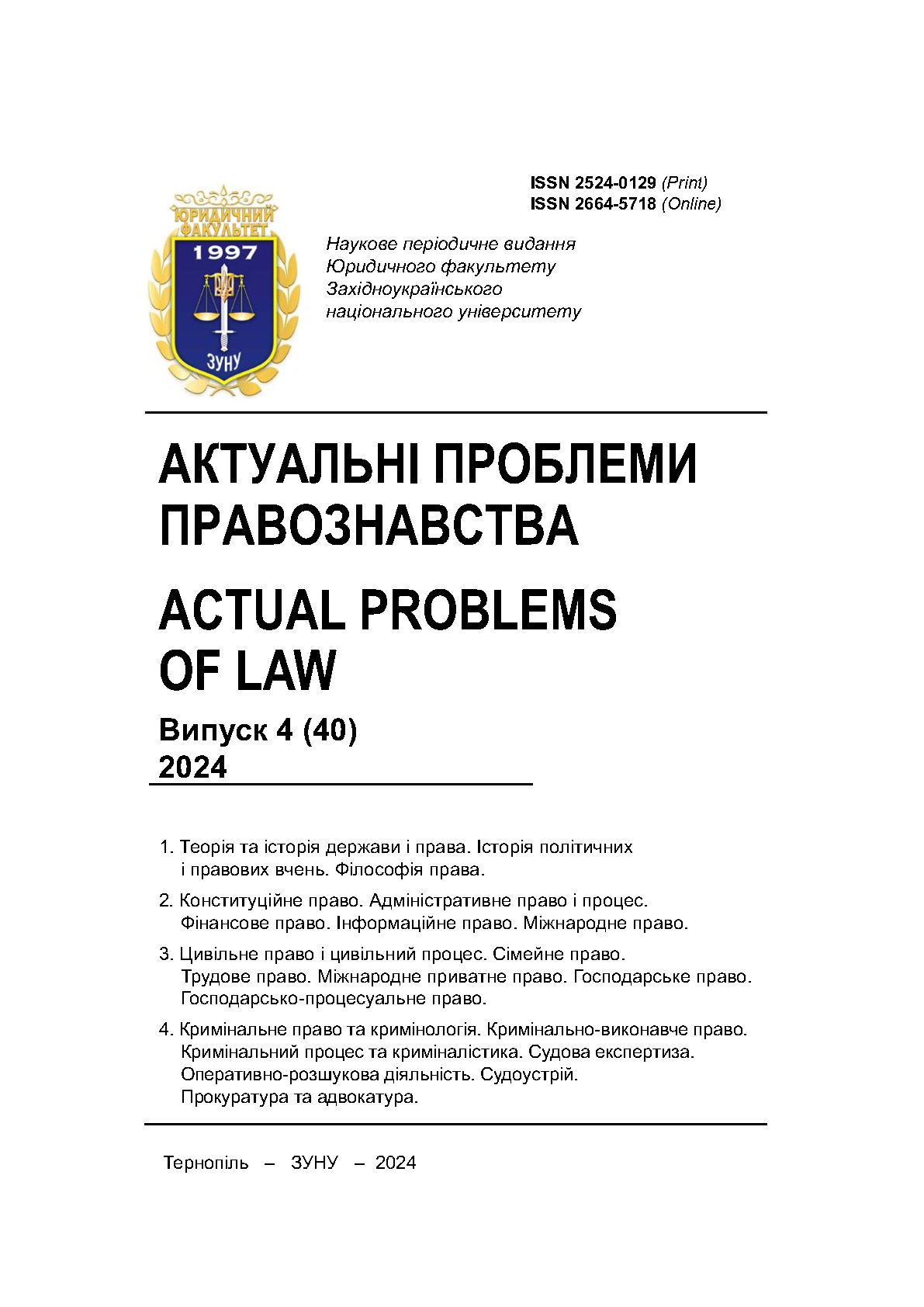Peculiarities of forming multicultural competence in the process of training law students
DOI:
https://doi.org/10.35774/app2024.04.123Keywords:
multicultural competence, law students, lawyers, client, communicationAbstract
The article deals with the practical aspects of pedagogical training of lawyers' multicultural competence. Given the growing diversity of social relations and communication among future lawyers, they need to master the methods and techniques of effective communication and establishing trusting relationships with clients representing different cultures, ethno-religious and linguistic communities, and social strata. The author recommends a number of mechanisms for conducting practical classes (training sessions) for the development and practice of multicultural communication. Certain practical recommendations are aimed at assisting teacher educators in the process of training law students to apply multicultural competence in their professional activities.
In conclusion, given the significant benefits of intercultural skills to a lawyer's intercultural competence, law student training should be offered as a minimum through an elective course, if not mandatory, in the curricula of all law schools across the country. As part of such a course, it is advisable to offer a set of seminar sessions in which professors can use the five skills of the Bryant and Peter methodology to teach law students how to interact with and solve problems that may arise in the course of working with different clients. Regardless of which model is used, intercultural competence skills should be taught in law schools.
Downloads
References
1. Pate, S. (2014). Cultural Competency Training: Preparing Law Students for Practice in Our Multicultural World, 62 UCLA L. REV., DISC., 140 [in English]
2. Bryant, S. (2001). The Five Habits: Building Cross-Cultural Competence in Lawyers., 8 Clinical L. REV. 33, 39 [in English]
3. Robert, L. Gegios & Stephen, D. R. Taylor. Cross-Cultural Competency: A Non negotiable Skill for Lawyers Involved in International Commerce. Retrieved from http://www.primerus.com/businesslaw-articles/cross-cultural-competency-a-non-negotiable-skill-for-lawyers-involved-in-international-commerce-624201.htm [in English]
4. Frink-Hamlett, K. (2011). The Casefor Cultural Competency, N.Y. L.J.. Retrieved from http://www.law.northwestern.edu/career/markettrends/2011/ plebiuwle1po.pdf [in English]
5. Medvedenko, S. V. & Sytko, S. O. (2023). Problemy formuvannia mizhkulturnoi komunikatyvnoi kompetentnosti maibutnikh yurystiv [Problems of forming intercultural communicative competence of future lawyers]. Pivdennoukrainskyi pravnychyi chasopys - South Ukrainian Law Journal, 1, 242-247 [in Ukrainian] https://doi.org/10.32850/sulj.2023.1.42
6. Adams, T. (2012). Cultural Competency: A Necessary Skill for the 21st Century Attorney. Lzw Raza Journal, 4(1), 1-22 [in English]
7. Hamaniuk, V., Karpiuk, V., Shumilina, I. & Ustinova, V. (2024). The concept of «intercultural competence» in educational and scientific discourses. Educational Dimension, 11, 1-27. Retrieved from https://doi.org/10.55056/ed.715 [in English]
8. Vasylenko, O. (Dec. 2022). Intercultural competence: Concepts, structure, principles and methods of development. Adult Education: Theory, Experience, Prospects, 22(2), 59-67. Retrieved from https://doi.org/10.35387/od.2(22).2022.59-67 [in English]
9. Reimann, D. (2015). Inter-und transkulturelle kommunikative Kompetenz. ProDaZ, 1–29. Retrieved from https://www.uni-due.de/imperia/md/content/ prodaz/reimann_intertranskulturelle_kompetenz.pdf [in English]
10. Rembach, O. O. (2017). Development of Future Lawyers Intercultural Competence in Foreign Languages Training. Universytetski naukovi zapysky 63(3), 387-400. Retrieved from http://old.univer.km.ua/visnyk/1673.pdf [in English]
11. Maksymovych, O. V. (2020). Intercultural competence as a subject of sociological theoretical approach in terms of social and cultural interaction studies at the borderlands. Habitus, 1(12), 97–104. Retrieved from https://doi.org/10.32843/2663-5208.2020.12-1.16 [in English]
12. Halchun, N. P. (2021). Theoretical understanding of the concept of intercultural competence in modern scientific research. Innovative Pedagogy, 35, 157-163. Retrieved from https://doi.org/10.32843/2663-6085/2021/35.32 [in English]
13. Deardorff, D. K. (ed.). (2009). The SAGE Handbook of Intercultural Competence. Sage Publications. Retrieved from https://www.ucg.ac.me/skladiste/blog_ 7764/objava_67219/fajlovi/Interkulturalna%20kompetencija.pdf [in English] https://doi.org/10.4135/9781071872987
14. Borisko, N. (Feb. 2018). Problems of cross-cultural training of pre-service foreign language teachers. The scientific and methodological journal «Foreign Languages», 1, 9-20. Retrieved from https://doi.org/10.32589/im.v0i1.124861 [in English]
Downloads
Published
Issue
Section
License

This work is licensed under a Creative Commons Attribution-NonCommercial 4.0 International License.





